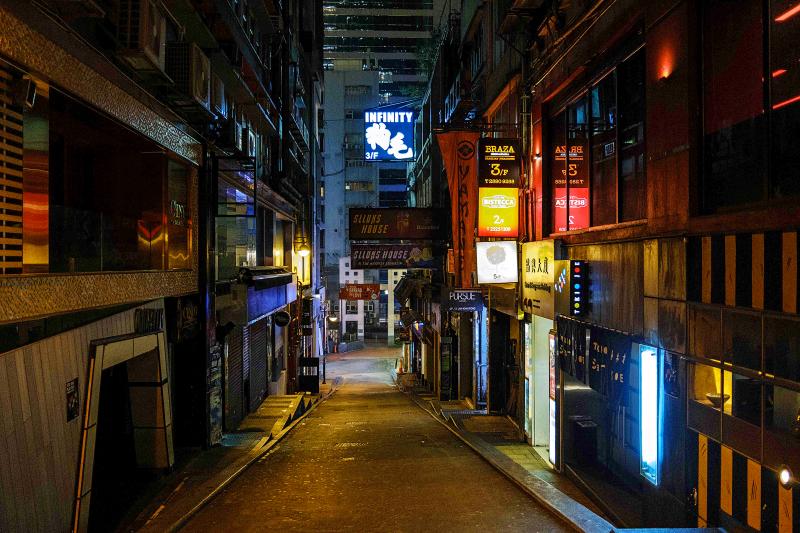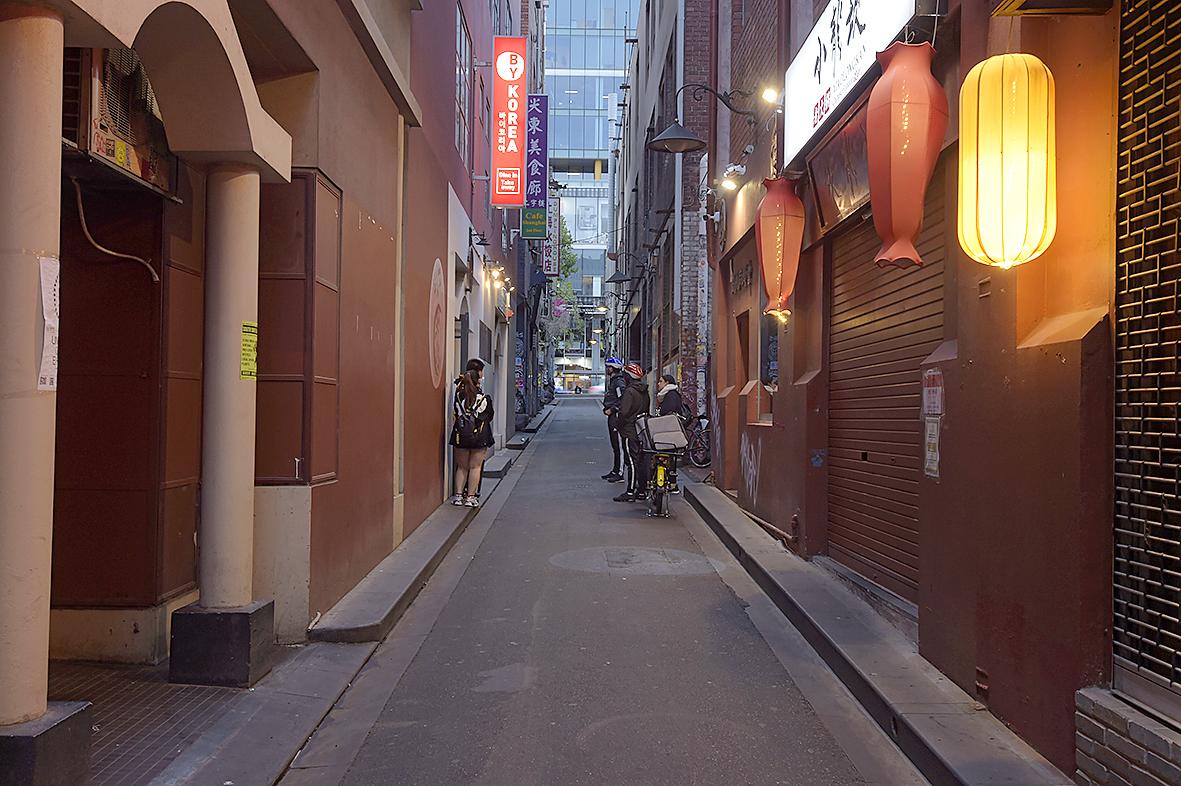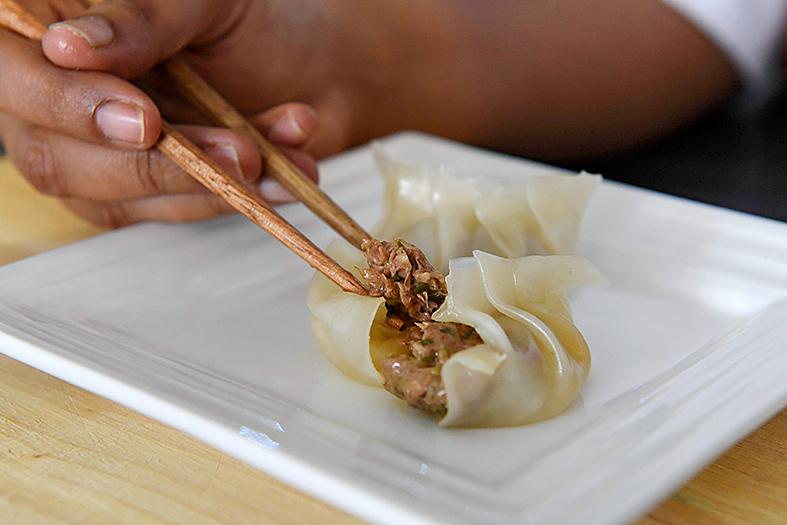Singapore’s Odette has held on to the title of Asia’s best restaurant for the second year running, as top chefs grapple with city lockdowns, temporary closures of their restaurants or food-supply interruptions during the coronavirus pandemic.
Cantonese restaurant The Chairman in Hong Kong, Tokyo kaiseki eatery Den, neo-Parisian bistro Belon in Hong Kong and Singapore-based barbecue restaurant Burnt Ends rounded out the top five. The winners were announced in a video livestream, in place of a ceremony originally planned for Saga prefecture, Japan, during cherry blossom season.
Odette chef Julien Royer said his three-Michelin-starred restaurant has been “working hard to support guests who have had to delay their visits and change travel plans.”

Photo: AFP
“In unpredictable times food can be a source of comfort,” Royer said in an e-mail interview. “And now more than ever we wish to offer our guests the comfort of a beautiful and thoughtful meal above all else.”
Over the past year, Royer has experimented with ingredients like zesty Buddha’s hands fruit and pickled ginger flowers, with the latter adding acidity to Odette’s “flower” of cured hamachi, a fish that’s very popular in Japan.
“Ginger … helps fight coughs and colds, which is especially helpful during this time,” he said.

Photo: Bloomberg
Royer used kampot pepper to spice up Odette’s signature pigeon recipes, and added Asian flavors like wasabi and Nashi pear to his Normandy brown crab dish. He also sought fresh produce from the city’s few farms, including jicama, baby beets and blue peas alongside tarragon flowers grown by Odette’s chef de cuisine, Adam Wan.
New entries included Inua in Tokyo; Bukhara in New Delhi (which makes a return after dropping off the list in 2017); Macau’s Sichuan Moon (closed until further notice); JL Studio, serving Singaporean cuisine in Taichung, Taiwan; and one-Michelin-starred Hansikgonggan in Seoul, whose chef and owner, Cho Hee-suk, also won the Asia’s Best Female Chef award.
CHALLENGES

Photo: AFP
The challenges facing restaurants around the region may vary, but few businesses will remain unscathed by the coronavirus outbreak. However, even as the crowds keep their distance the culinary experimentation continues.
In Bangkok, Suhring (No. 6 on the list) suspended operations until April 30 after Thailand’s government ordered schools, shopping malls and restaurants to close. The coronavirus has infected more than 700 in the country.
“The outbreak has been harsh on us and the majority of our peer[s] around the world,” said Thomas Suhring, who opened the restaurant with his twin brother Mathias in 2015. “We have seen a huge decrease of visitors from around the world.”
Prior to the shutdown, Suhring took temperature checks on guests and staff, and spaced tables up to two meters apart so that guests could enjoy German dishes including Simmentaler beef with caviar on whole grain bread and spatzle (egg noodles) served with fresh truffles. A professional cleaning company was tasked with disinfecting the restaurant twice a week.
Just a 14-minute drive from Suhring’s location in Bangkok, Indian fusion restaurant Gaa (No. 15) is planning to launch a takeaway and delivery program due to restrictions on dining out. It has also urged staff to stay home if they are feeling unwell. “We are not taking any chances,” said Chef Garima Arora.
Gaa revamped its menu format at the start of this year after Arora visited her hometown, Mumbai, and realized “that a coursed meal is just not how we eat back at home.” That inspired Gaa’s current menu of five festive feasts. Each feast has a theme, such as street food (fruit chaat; duck liver on toast), seafood (scallop papadum; crayfish) or vegetarian dishes (roselle saag; corn bread).
Asked what she would cook if Thailand were to impose a total lockdown, Arora said: “I honestly never cook at home and I don’t think any cook wants to spend time in the kitchen on their day off … but everybody knows my comfort food is nachos. I can always have it.”
Bangkok scored a new entry on this year’s list with 80/20, a Thai restaurant run by husband-and-wife team Napol Jantraget and Saki Hoshino.
Meanwhile, Singapore-based Burnt Ends (No. 5) has kept a worried eye on the flights delivering its fresh goods each week as shipping delays become the norm. The barbecue restaurant sources about 85 percent to 90 percent of its supplies from overseas, including Japan and Australia, according to Australian chef and owner Dave Pynt.
Burnt Ends, which has one Michelin star, started cooking in recent months with firefly squid, A5 wagyu (the highest Japanese rating for this cut of steak), maitake mushrooms and a buttermilk-brined lamb. A visit to Katz’s Delicatessen in New York also made a lasting impression: Pynt started experimenting with homemade pastrami.
Pynt says while the restaurant has seen a drop-off in tourists, local diners have stepped up to support his business. To ensure safety, kitchen and wait staff undergo temperature checks two times a day. Hand sanitizers are made available to diners, and guests who are noticeably unwell are asked to leave.
“I’m worried,” Pynt said in a phone interview, when asked about how the virus is impacting business. “It’s really hard. You want to be positive … But I think for the world to get back to some sort of normality, it’s going to be a long slog.”
Meanwhile, in Hong Kong, Chef Richard Ekkebus of two-Michelin-starred Amber (No. 31) said food-supply logistics have been “a challenge.” But he says the restaurant has been able to source the ingredients it needs to continue serving its French menu, which includes dishes such as pigeon with foie gras, pepper berry and blackcurrant as well as spelt with black trumpet mushroom and preserved black truffle.
Amber reopened in April 2019 with a renovated interior and a new menu that eliminated what Ekkebus calls “the usual tricks of the trade,” including butter, refined sugar and salt, so that ingredients’ natural flavors could shine through.
“Where salt is needed,” he said, “it’s distilled from natural umami through ingredients like seaweed or techniques like fermentation. Where dairy is required, we’ve searched for plant-based alternatives.”
Mume in Taipei (No. 18 and the best restaurant in Taiwan) has seen a drop in its usual tourist clientele, prompting it to close once or twice a week and to limit the number of reservations to ensure ample space between diners. Mume’s staff wear face masks at all times and to check guests’ temperatures before they sit down. The chefs wear antimicrobial gloves while preparing food.
“Just like most business[es] and maybe 99 percent of the hospitality industry, we are of course greatly affected by the outbreak,” said Mume’s chef and owner, Richie Lin.
Lin can count one blessing: His food is 99 percent locally sourced, enabling him to offer a tasting menu that includes cuttlefish with mullet roe and black garlic as well as abalone and duck risotto. Lin says his interest was piqued by indigenous ingredients such as “wild vegetables that is foraged by aboriginal [people]” of Taiwan.
Manila chef Jordy Navarra had to temporarily close Toyo Eatery (No. 44) — the highest-ranked in the Philippines and known for succulent three-cut pork barbecue alongside 18-vegetable salad — as the city entered quarantine. Philippine President Rodrigo Duterte ordered a lockdown on Luzon, the country’s largest island and its economic engine, until April 13.
“Right before we closed,” Navarra said, “we prepared and baked bread that we donated to some of the health workers and support staff.”
Navarra, who is self-quarantined at home with his wife and dogs, sees an upside to the pause: “In a way it’s given our team a chance to relax and spend time away from the hustle of the restaurant.”
William Drew, Director of Content for Asia’s 50 Best Restaurants 2020, said pushing ahead with this year’s awards was a way to recognize the hard work of chefs and their teams over the past year “even when so many restaurants have suffered or closed.”
“The challenges for the hospitality and gastronomic sector as a whole are certainly the biggest any of us has ever witnessed since the birth of fine dining or the modern restaurant sector as we know it,” Drew said in an e-mail interview. “All we can all do is try to support each other, send positive messages, stay connected and prepare for recovery once the situation improves, whenever that may be.”
Asia’s 50 Best Restaurants list is selected and voted on by a panel of 300 food writers, critics, chefs, restaurateurs and foodies — half of them women — across Asia. The awards have been held and published each year since 2013 by William Reed Business Media.

Taiwan has next to no political engagement in Myanmar, either with the ruling military junta nor the dozens of armed groups who’ve in the last five years taken over around two-thirds of the nation’s territory in a sprawling, patchwork civil war. But early last month, the leader of one relatively minor Burmese revolutionary faction, General Nerdah Bomya, who is also an alleged war criminal, made a low key visit to Taipei, where he met with a member of President William Lai’s (賴清德) staff, a retired Taiwanese military official and several academics. “I feel like Taiwan is a good example of

March 2 to March 8 Gunfire rang out along the shore of the frontline island of Lieyu (烈嶼) on a foggy afternoon on March 7, 1987. By the time it was over, about 20 unarmed Vietnamese refugees — men, women, elderly and children — were dead. They were hastily buried, followed by decades of silence. Months later, opposition politicians and journalists tried to uncover what had happened, but conflicting accounts only deepened the confusion. One version suggested that government troops had mistakenly killed their own operatives attempting to return home from Vietnam. The military maintained that the

Jacques Poissant’s suffering stopped the day he asked his daughter if it would be “cowardly to ask to be helped to die.” The retired Canadian insurance adviser was 93, and “was wasting away” after a long battle with prostate cancer. “He no longer had any zest for life,” Josee Poissant said. Last year her mother made the same choice at 96 when she realized she would not be getting out of hospital. She died surrounded by her children and their partners listening to the music she loved. “She was at peace. She sang until she went to sleep.” Josee Poissant remembers it as a beautiful

Before the last section of the round-the-island railway was electrified, one old blue train still chugged back and forth between Pingtung County’s Fangliao (枋寮) and Taitung (台東) stations once a day. It was so slow, was so hot (it had no air conditioning) and covered such a short distance, that the low fare still failed to attract many riders. This relic of the past was finally retired when the South Link Line was fully electrified on Dec. 23, 2020. A wave of nostalgia surrounded the termination of the Ordinary Train service, as these train carriages had been in use for decades